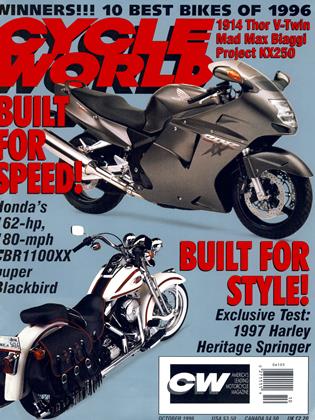TRADEMARK TROUBLES
First Harley-Davidson took on aftermarket engine suppliers, now it tackles knock-off stylists
HOT ON THE HEELS OF CONTINUING EFFORTS TO PATENT the sound made by its single-crankpin V-Twins (see CW, November, 1995), Harley-Davidson is seeking to trademark the design configurations for its Electra Glide, Heritage Softail Classic and Sportster motorcycles, and the FL-style front fender. “We have an obligation to our customers, dealers, employees, shareholders and licensees to protect the assets of our company, as they carry significant value in the marketplace,” says Harley. “We want to protect the investments our customers have made in genuine, authentic Harley-Davidson products by making it difficult for companies to produce counterfeit and infringing products.”
Responses to the Motor Company’s requests are wideranging. As of presstime, Suzuki and Yamaha were considering their options. “I question how Harley-Davidson could trademark something so basic,” says Yamaha’s Bob Starr. “We’re talking about a style of motorcycle, a cruiser.” Honda and Kawasaki declined comment.
Aftermarket powerhouse Custom Chrome says it will file oppositions with the U.S. Department of Commerce, Patent and Trademark Office. Last year, FL-style fenders generated $233,000 in retail sales for the company. “If the trademarks are granted and fully prosecuted by Harley, it could
be very damaging to the industry and motorcycling as a whole,” says Custom Chrome’s Steve Davey. “But the people who stand to lose the most are the ‘clone’ market-the Big Dogs and the Illusions.”
Sheldon Coleman, president of Big Dog Motorcycles, stands behind his products. “Our bikes are titled, registered and insured as Big Dogs. We claim in no way to be a Harley-Davidson, yet we find ourselves spending needless time and money fighting attempts to restrict the shape of our fenders, the sound of our motor and whatever Harley’s next trademark attempt will be,” he says.
According to the trademark office, competitors have 30 days from the date the application is published to file an opposition or to request an extension. “Unfortunately, there will be a lot of people in this industry who will be affected but can’t afford a lawyer,” Davey says. “We spent many thousands on 1995’s FTC ruling (dealing with genuine vs. aftermarket accessories) alone.”
Don’t expect Harley-Davidson to back down, though: “While we welcome competition, our message to other motorcycle and parts manufacturers is clear: We respect your trademarks and expect that you will respect ours.” -Matthew Miles
 View Full Issue
View Full Issue












